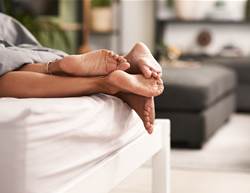Women who are perimenopausal or post-menopausal often admit to sex therapist Dr Ian Kerner that they find themselves groaning not with pleasure but with pain during sex. And if this becomes a pattern, it often leads to a waning interest in, if not outright avoidance of, sex. When you’ve enjoyed a perfectly happy sex life until now, what’s going on?
The natural hormone shifts that occur during menopause can cause the vaginal walls to dry and thin out. Without effective lubrication, unpleasant chafing can occur. And some medications don’t help. Even decongestants can contribute to dryness. For some women, pain occurs because the vaginal walls contract during penetration. Known as vaginismus, this is one of the two most common causes of painful sex. “These contractions may have psychological roots, such as past sexual trauma,” says Kerner. He says mindfulness exercises can help: “Imagine yourself in a time and place in which you felt calm and pain-free. This can help vaginal touch become more comfortable.”. The other main cause of pain is vulvodynia, which is usually experienced around the vaginal entrance. Many women characterise the sensation as burning, stinging, tender and abrasive, although sometimes the pain is felt deeper in the vagina, as well. Kerner says the first strategy with any form of painful sex is to use an artificial lubricant. He recommends a water-based lube, such as KY Jelly. But it’s not the only line of defence.
There are other treatments you can discuss with your doctor, including the following:
- Oestrogen-based vaginal creams that are available on prescription can ease dryness. Unlike water-based lubricants which have no lasting effect, these creams are designed to be absorbed and, with regular use, can change the texture of the vagina.
- Testosterone supplements. From our 20s onwards, women’s production of testosterone declines. Controlled studies have found that slightly raising our levels of testosterone can improve libido and arousal, and therefore vaginal lubrication.
- Laser-pulse therapy is used to stimulate collagen growth in the vaginal walls. It’s fairly new to Australia and you can find clinics that offer this by searching online.
- Botox can be a remedy for more serious forms of vaginismus. But if you’re going to explore this, be sure to look for a reputable clinic. At the same time, advises Kerner, it is important to be open with your partner while you are seeking a solution. “It’s a good idea for couples to work together by shifting the focus from intercourse to another form of intimacy, such as oral sex, which may allow the woman to remain sexual and orgasmic with her partner,” he says.
Here are some over-the-counter lubricants that can help ease dryness:
1. KY JELLY is arguably the most well known water-based lubricant that can provide temporary relief from vaginal dryness during sexual intercourse. It is available from pharmacies without a prescription.
2.SLIQUID ORGANICS LUBRICANT is free of glycerine and made from botanical extracts, it is available from selected pharmacies and online.
3. PJUR MED SOFT GLIDE contains jojoba oil for longer-lasting lubrication. From selected pharmacies and online.










